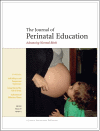
Prenatal and Postnatal Diagnosis of Infant Disability: Breaking the News to Mothers
The birth of an infant with a disability is often perceived as the loss of a “perfect” baby and is typically an unanticipated event for the mother and family. Mothers may experience self-blame for the disability; therefore, sensitive communication is crucial. A private setting
is recommended, with a minimum of health-care professionals in attendance when the diagnosis is revealed. The perinatal educator can guide the mother through the early emotional phases of processing and accepting the new information by offering support and incorporating timely information
and interventions. The perinatal educator can also inform and prepare other expectant couples in the childbirth class and encourage them to support the mother and father in celebrating the forthcoming birth. The objective of nursing care for a mother whose infant is newly diagnosed with a
disability is to facilitate a positive outcome for her and to promote optimal infant bonding. In all communication and information, replacing the term “disabled infant” with “infant with a disability” is emphasized in order to recognize the infant first and the disability
second.
Keywords: infant with a disability; informing parents; postnatal diagnosis; prenatal diagnosis
Document Type: Research Article
Publication date: 01 June 2008
- The Journal of Perinatal Education is no longer available to subscribers on Ingenta Connect. Please go to http://connect.springerpub.com/content/sgrjpe to access your online subscription to The Journal of Perinatal Education.
- Access Key
- Free content
- Partial Free content
- New content
- Open access content
- Partial Open access content
- Subscribed content
- Partial Subscribed content
- Free trial content